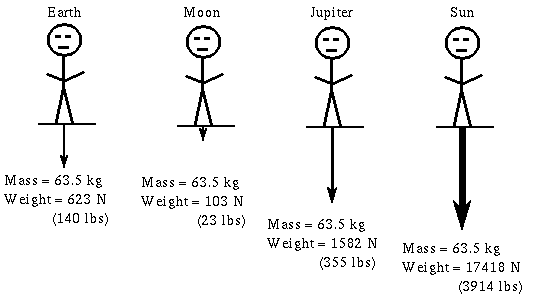Video lecture for this chapter
This material (including images) is copyrighted!.
See my copyright notice for fair use
practices.
Though the terms weight and mass are used interchangeably in
common language, in science there is distinct difference between the two terms. The
weight of an object = force of gravity felt by that object but the
mass of
an object is the amount of matter the object has. Mass is a measure of the
object's resistance to acceleration: a push on a skateboard will make it roll
away quickly but the same push on a more massive car will barely budge it.
An object's weight depends on the pull of the
gravitating object but the object's mass is independent of the gravity. For
example, Joe Average weighs himself on the Earth's surface and then on the Moon's
surface. His weight on the Moon will be about six times less than on the
Earth but the number of atoms in his body has not changed so his mass is
the same at the two places. In the old English unit system, there is a
``pound'' of force and ``pound'' of mass. On only the Earth's
surface, an object's pound of mass = the number
of pounds of force felt by the object due to the Earth's gravity.
In the metric system there is no confusion of terms. A kilogram is a
quantity of mass and a newton is a quantity of force. One
kilogram (kg) = 2.205 pounds of mass and 4.45 newtons (N) = 1 pound of force. If
someone uses ``pounds'', be
sure you understand if s/he means force or mass!
How do you do that?
To find something's weight in
newtons, you multiply the mass in kilograms by the acceleration of gravity in the
units of meters/seconds2. For example: Joe Average has a mass
of 63.5 kg and
he feels a force of gravity on the Earth = 63.5 kg × 9.8 m/s2 =
623 kg m/s2 = 623 N.
His weight is 623 N. The other value in the preceding equation, 9.8
m/s2, is the acceleration due to gravity close to the Earth's surface.
Joe Average's weight at other places in the universe will be different
but his mass will remain the same.

|
Vocabulary
| kilogram | mass | newton |
| weight |
- What is the difference between mass and weight?
- When the astronauts landed on the Moon, how were they able to stay on the
ground?
- On the Moon, the astronauts weighed about six times less than they did on
the Earth. Compare the amount of gravity on the Moon's surface with that on the
Earth's surface. If objects fall with an acceleration of about 10 m/s2 on the
Earth, how much would the acceleration be on the Moon's surface? Explain
your answer.
- If Joe Astronaut has a mass of 40 kilograms on the Earth, how much mass would
he have on an asteroid with 10 times less surface gravity than the Earth's surface
gravity? Explain your answer.
 Go back to previous section --
Go back to previous section --
 Go to next section
Go to next section
last updated: 11 May 2001
Is this page a copy of Strobel's
Astronomy Notes?
Author of original content:
Nick Strobel
